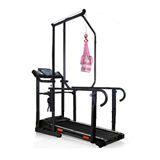The research could change the way physical rehabilitation takes place, with findings showing that exercise improved the ability of participants' brains to rewire nerve connections.
In a study of 25 healthy adults, Dr Michelle McDonnell and her team found that the brain was able to more effectively rewire nerve connections — termed neuroplasticity — in the hand after 30 minutes of low intensity cycling.
"This is an exciting discovery because it suggests that exercise can have effects on the brain's capacity to rewire and learn in areas not actually involved in the exercise," Dr McDonnell says.
"We have shown that gentle aerobic exercise has the potential to prepare the brain for rewiring itself for people with brain damage, which may make rehabilitation more effective."
Based at UniSA's Division of Health Sciences, Dr McDonnell is now exploring exercise's ability to promote neuroplasticity in people who have had a stroke. She is currently recruiting study participants who have suffered a stroke at least six months ago.
"This research could significantly change physical rehabilitation for people recovering from stroke," Dr McDonnell says.
"If exercise encourages neuroplasticity for rehabilitation patients after stroke, this could mean rehab sessions might involve gentle cycling prior to physiotherapy sessions, which would be a huge change in rehabilitation practices.
"While it's still early days, we believe certain chemicals in the blood get released when we exercise that encourage neuroplasticity, meaning that exercise can activate and affect a wide range of brain areas."
Dr McDonnell is looking for adults aged 18-60 living in the Adelaide area, who suffered a stroke at least six months ago to participate in the new study.
For more information or to get involved, contact Dr McDonnell on 8302 1684.




